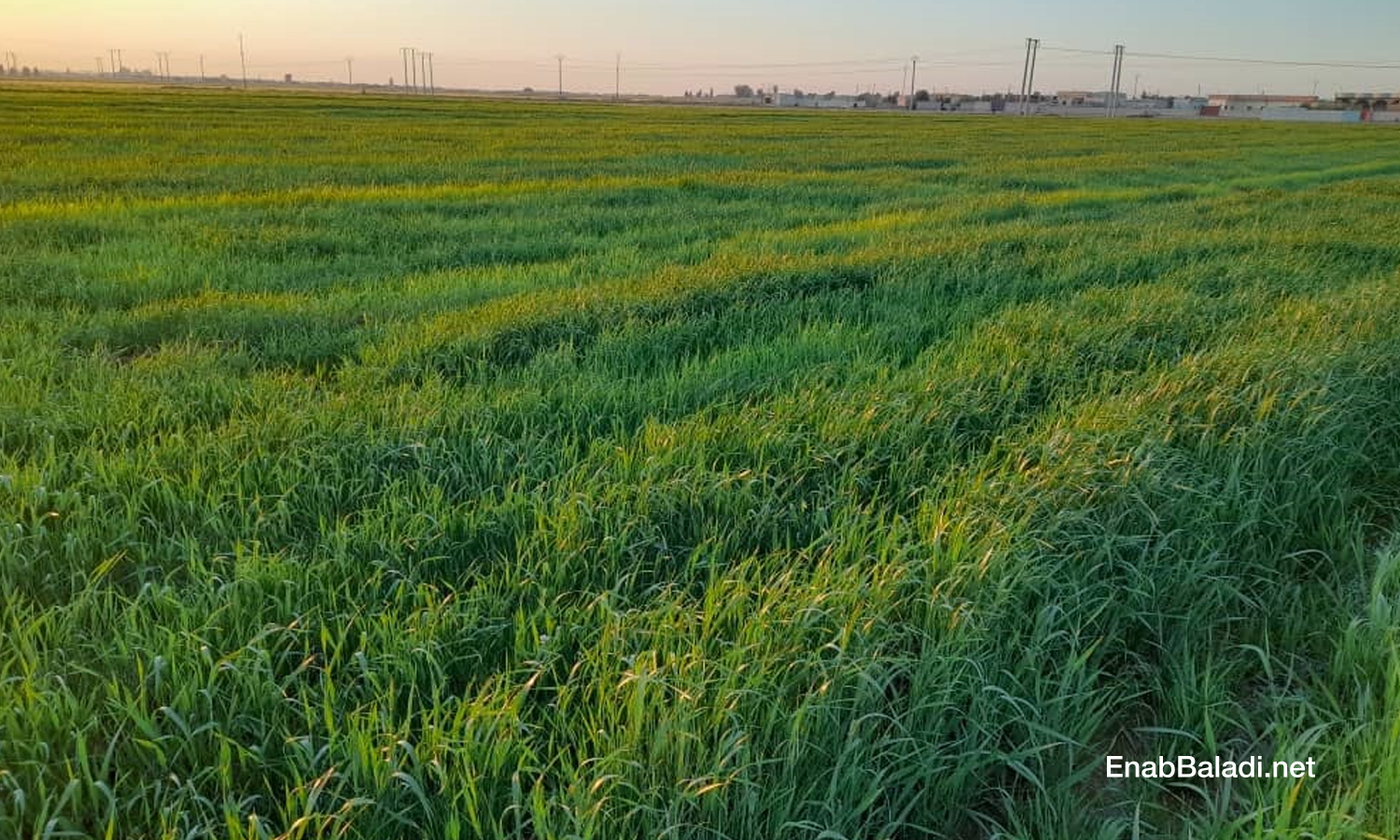



Al-Raqqa – Hussam al-Omar
“Everyone is in danger! It is the responsibility of all members of society. The next crisis will adversely affect both officials and citizens,” said one member of the Agriculture and Irrigation Committee, underscoring the risks surrounding the upcoming wheat season in northern and eastern Syria.
The Agriculture and Irrigation Committee is concerned about a decline in wheat production the next season because farmers resorted to “letting out” their cultivated plots of land to shepherds because they could not look after their wheat crop.
Farmers have been leasing lands planted with wheat for less than one month to shepherds, which use them for grazing livestock. In exchange, farmers get a sum of money they agree to with the shepherds.
Farmers resort to letting wheat fields under grazing licence when they no longer can afford to attend to the crops or because the crops are exposed to agricultural pests or frost waves that cause them damage before the harvesting time. At the end of the lease agreement, farmers start to grow their lands with a new crop.
The member of the Agriculture and Irrigation Committee, who declined to be named because he did not have a permit to speak to the media, told Enab Baladi that the “committee” tried to take several measures to improve the agricultural situation, especially wheat cultivation. It provided farmers with seeds, fertilizers, and diesel for the irrigation of crops.
Among the actions taken by the committee, a circular was issued on 27 March, calling on farmers not to “let out” their wheat crops to shepherds as to preserve the “strategic” crop stock and ensure food security, which is being under serious threat for all citizens.
The circular issued by the committee held farmers responsible for preserving wheat stocks and entrusted agriculture offices and extension units in the countryside of Raqqa to monitor its implementation and to refer the farmers violating the circular to the competent court.
The committee member described the circular as a pro-active step for a possible decline in the current year’s wheat production due to drought and lack of rainfalls, as well as the reduction of the wheat cultivated area.
He pointed out that there are no comprehensive statistics on the area of land cultivated with wheat, but the decline appears to be “remarkable.”
Ragheb al-Rajab, 40 years old, a farmer from the village of Asadiya, north of Raqqa, confirmed to Enab Baladi that grazing lease is a “bad option,” which the farmer uses when he is unable to look after his crop.
“We, farmers, have to make this bad choice if we are not sufficiently provided with real support from officials. We need more fuel and fertilizers, reduce their prices at least or give us loans in order not to lease our crops.”
Al-Rajab indicated that the support announced by officials is not enough to avoid farmers grazing lease.
For his part, Abdul Rahman Muhammad, a 40-year-old shepherd, told Enab Baladi that shepherds turn to grazing lease in dry seasons, which is accompanied by high prices of fodder, as in the current season. A kilo of barley and wheat bran, the most important fodders in the area, has amounted to 1,000 Syrian pounds (SYP).
Muhammad demanded feedstuffs be sold at an acceptable price so that the shepherds would not be forced to let out the lands cultivated with significant crops.
There are several signs of a decline in the current year’s wheat production, agricultural engineer Hussein al-Rajab, from the southern countryside of Raqqa, told Enab Baladi in a previous interview. He also said the agricultural yields have decreased in the region, noting that farmers have abandoned agriculture for other jobs.
Hussein also said that next season will also see the emergence of many agricultural pests due to the observed climate change this year. Rainfalls and cold waves used to kill the majority of pests that cause different damages to the agricultural lands, “but this year we may witness the worst wheat harvest.”
The areas governed by the Kurdish-led Autonomous Administration encounter difficulties in addressing the population’s needs of bread, despite the production of nearly 900 thousand tons of wheat during 2019 and 2020, according to a statement by the co-chair of the Autonomous Administration’s Commission of Agriculture and Economy, Salman Barudo, to North-Press Agency on 23 June 2020.
As a result, the administration has taken several measures including restricting the person’s share of the administration-subsidized bread—a person can only get two loaves of bread per day. One bundle of bread has been sold for 125 SYP (0.037 USD) since February.
if you think the article contain wrong information or you have additional details Send Correction